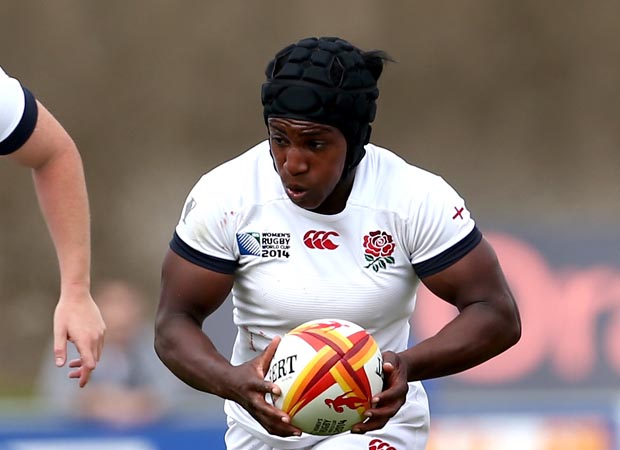 All good things come to an end but you can sense Maggie Alphonsi’s reluctance to leave the international scene.
All good things come to an end but you can sense Maggie Alphonsi’s reluctance to leave the international scene.
England‘s openside flanker has been having such fun recently.
Alphonsi finally got her hands on a World Cup winner’s medal last Sunday after 11 years putting her body on the line for England and with the last great challenge of her international career complete it’s time to look to the future. Isn’t it?
Well, yes, it almost certainly is, but there is always that temptation to linger in the departure lounge when you contemplate heading off in a new direction. With the excitement and euphoria of last Sunday’s World Cup final win over Canada at last beginning to die down, Alphonsi has been mulling it all over this week, going through one final mental checklist to make sure it’s the right call at the right time.
“It’s definitely decision time so I’ve been giving myself a few days away from the excitement to think it through,” admits Alphonsi. “I am only 30 which is actually no great age at all these days and a few of the girls around that age are definitely thinking of going on. And it’s a great time to be involved in women’s rugby as a player. The game is heading towards another level.
“That’s the argument for hanging on. You are a long time retired. Against that is the thought that I have probably achieved everything I aimed for in my international career and is there any pressing reason to continue at Test level although whatever happens I’m looking for at least one more full season with my club Saracens.
“Winning has always been my thing. As a youngster I loved watching the Olympics and it was always winning the gold medal that counted and as a rugby player for England I’ve always wanted to achieve the ultimate, win championships – our gold medals if you like.
“I’ve now helped win a World Cup and some extraordinary and humbling honours have come my way – an MBE, an IRB Player of the Year award, the Pat Marshall award from the rugby writers. I also look around and see so many great players coming through in the back-row. Alex Matthews, Marlie Packer, Heather Fisher and Hannah Gallagher. These players, realistically, are the future of English rugby and they need the chance to shine.”
It’s been some innings by a fearless, power packed and remorseless flanker – she is known as the “machine” – who could have excelled at any sport she chose despite being born with a club foot. Athletics’ loss was rugby’s gain while you fancy her recovery rides with Amersham Cycling Club every Sunday morning will quickly escalate into something much more competitive when the boots are finally consigned to the loft.
There have been 75 England caps, seven Six Nations titles, including six Grand Slams, and three World Cup finals although the mere statistics don’t really do her justice. They take no account of her bravery on the floor diving into flying boots and bodies to secure 30-70 balls, her thunderous tackling and general commanding presence at the breakdown. Think Peter Winterbottom and you won’t go far wrong in the influence she exerted for England and the respect afforded by opponents and colleagues alike.
It’s been a hugely significant international career although it nearly came to a premature end soon after the World Cup when the machine started to break down and malfunction in a serious way.
“I was devastated when we lost the 2010 World Cup final to New Zealand by three points, it was a real low point and the start of some difficult years. The main problem was injury, a meniscus tear that kept me out for 20 months and the timing was such that I was basically out for two seasons. It was a pretty serious injury but the surgery went well and it should only have kept me out for half that time but it became very complicated.
“The injury and surgery and then the rehab set off a chain reaction of injuries down the right hand side of my body where I have my club foot – the foot points in more than usual – and the biomechanics down the right hand side of my body went a bit haywire. Until I got injured everything miraculously seemed to work in its own sweet way but afterwards all the muscles and joints started reacting and overcompensating so as well as the knee I started getting big hamstring and lower back problems and pains in the foot.
“It was like a pack of cards crashing down. One thing after another. In the end it was time more than anything that saw me turn the corner. The body needed to time to settle back down.
“It definitely got to the stage of asking myself whether I was ever going to get back playing properly. I had to ask myself how badly I wanted to play again or was it time to give up. I spoke to a lot of friends and people I trust and the message was pretty much the same from all of them. ‘Have you achieved what you set out to achieve in your rugby career?’ they all asked. And the answer was always, ‘No’. I hadn’t become a world champion, that gold medal winner I always wanted to be. So once I acknowledged that to myself all thoughts of retirement and were banished.
“It was still a long haul. Physio, massage and rehab most days although luckily all those costs were covered and we had the superb back-up of the English Institute of Sport. Eventually I got my body right and made it back just in time to complete pretty much a full season and challenge for a place in the England team again.
“If I’m honest I’m still a little bit off from where I was pre-injury and there will always be a weakness in the knee but equally I am much closer to that level than I ever thought possible. I felt very fit and strong at the World Cup and rugby smart as well. I was anticipating well and getting to the right place at the right time to make tackles and my reflexes were good which I always think is the crucial thing when you are challenging for the 50-50 balls on the ground.”
Alphonsi played a huge role in England’s World Cup win, not least in the semi-final against Ireland when England needed a big performance against talented opponents after a slightly lacklustre 13-13 draw against Canada. Instinctively you looked to Alphonsi to meet fire with fire and that’s exactly what she did with 20 bone shuddering tackles and a dominating performance at the breakdown. She pretty much replicated that performance in the final as well and for good measure was on hand to play an important role in creating England’s first try for Danielle Waterman.
“It was a really good campaign and looking back our frequent camps at Surrey Sports Park were very important. It gave us the time to get really fit and analyse our game but in a proper professional camp environment away from the pressures of work.
“Before the 2006 World Cup we had met up for several weekends which was something, but it wasn’t in all honesty a lot of time together. In 2010 we upped that a bit and managed a few camps which was progress but this time we’ve been able to meet in regular camps since the end of the Six Nations in March. We’ve been living the life of professional rugby players.
“The other big factor, for me anyway, was not winning the Six Nations last season. We lost our first match in France and although we came second it was a bit of a wake-up call, a real motivation in training. It also made us analyse our methods again. We had a really good look at how we were going about things. There was a lot of frustration to be worked off and hunger to improve and go to the next level.”
As for women’s rugby generally, Alphonsi only sees it going one way now. “It can only get bigger and better and there are a lot of high profile events in the pipeline to keep the momentum going. The Six Nations, the 2016 Olympics where the Sevens in going to be huge, the IRB World Series Sevens for Women and the 2017 World Cup. It’s all good.
“Part of me wishes I was 19 again. Players like Alex Matthews our young flanker have got it all before them. When I came into the game it was absolutely amateur and a massive struggle. Now it’s very different. We are on the cusp of professionalism.
“Our attitudes and standards are already professional and have been for a while, our coaching, back-up and medical facilities are professional, we were reimbursed for time off work during our camps this summer and the core Sevens players will live the life of a professional athlete.
“I am proud to have been part of a generation that helped get the women’s sport to where it is now. When I started we used to play in the back pitches at clubs and change in the toilets because there weren’t any changing rooms for us really. Now at Saracens anyway we play at Allianz Park and are treated really well. I know Wasps and Worcester and Darlington Sharks up at Kingston Park, Newcastle, have also played on the main pitch.
“Absolutely the biggest step forward the women’s game needs to make now is for the club game to grow. If you enjoyed the World Cup you will enjoy the Women’s Premiership. And if it could be played more often on the big club ground, before or after the men’s Premiership games, it would get more exposure and the profile would grow.
“I believe TV would come in, fans would get to know the individuals and personalities more and the whole thing would mushroom. I’d love to perhaps be part of that working on the media side of things.
“The emergence of 4G artificial pitches makes this more and more possible – you can play as many games on a pitch you want in any one day and match day becomes a real carnival of rugby. That’s the way we need to go.”
*This article was first published in The Rugby Paper on August 24.























